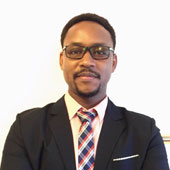William Tarimo, Ph.D. '17
William received a Spark grant to develop a technology to improve higher education classroom teaching
Teaching and learning have come a long way since the days of the first PCs. Today, 48 states and the District of Columbia have initiatives  for K-12 online learning. In higher education, technology in the classroom is a multibillion-dollar industry. Universities offer a range of technologies, from clicker-based quizzes to fully integrated online courses. At the heart of it all, though, the principles of teaching remain the same as they were when the first universities were founded: preparing the next generation of professionals and scholars through engaging dialog and the common creation of knowledge. His Brandeis Innovation project, Discovery Teaching, is hoping to create transformative new technology that brings the dialog of traditional learning into the mobile age.
for K-12 online learning. In higher education, technology in the classroom is a multibillion-dollar industry. Universities offer a range of technologies, from clicker-based quizzes to fully integrated online courses. At the heart of it all, though, the principles of teaching remain the same as they were when the first universities were founded: preparing the next generation of professionals and scholars through engaging dialog and the common creation of knowledge. His Brandeis Innovation project, Discovery Teaching, is hoping to create transformative new technology that brings the dialog of traditional learning into the mobile age.
William Tarimo’s project aims to foster dialog and knowledge creation by fixing the gap between what college faculty think is happening in the classroom, and what students think is happening. If that sounds provocative, it is. Many faculty rely on infrequent assessments to determine whether students are learning, or just reading students’ expressions. While that works in a seminar, it can leave students disengaged or struggling in a large lecture course. As with many educational challenges, Discovery Teaching aims to solve this longstanding issue with new technology. Its founder is well-prepared to do so. William recently earned his PhD in Computer Science here at Brandeis, where his research focused on developing applications and appropriate pedagogies for more effective learning and teaching in the classroom. What he found in his research is that faculty often lack the means to more accurately gauge students’ emotional and cognitive experiences in the classroom. And students have a difficult time having conversations about the emotional aspect of learning.
William found that many factors can lead students to disengage emotionally. Large class size, language difficulties, lack of familiarity with norms, and introversion are common reasons students withdraw psychologically. Once that happens, professors are even more challenged to assess students’ emotional and academic needs. This can lead to further withdrawal, contributing to poor outcomes for struggling students.
Enter Discovery Teaching. This app, built with extensive help from Brandeis Innovation, aims to bridge the gap between professors’ teaching styles and the emotional and cognitive styles of their diverse classrooms. It does so by providing continuous real-time feedback on students’ engagement, asking them to rate themselves as Engaged, Confused, or Bored throughout a class. A more popular tool, Questions, offers a clicker-type functionality for formative or diagnostic assessment in the class. This allows teachers to efficiently create questions and get immediate responses from all students, then grade those responses and gauge the understanding of the entire class as well as pinpoint misunderstandings of individual students. This allows faculty to re-engage students, identify those who are struggling, and even adjust teaching styles to different materials. The app also provides a robust Forum, which allows students who are too shy to speak in class, or who have language difficulties, to engage online. The app also facilitates what is often the most challenging aspect of large college classes: connection. Built into the app is a feature that assigns students to spontaneous groups for immediate, in-class problem-solving and discussions, so that classmates get to know and learn from one another. This also helps build a classroom culture of collaboration. The goal of Discovery Teaching, says William, is to “make sure no one is left behind. Engagement drops before other struggles become apparent,” he’s found, so if faculty address engagement early, students are more likely to graduate.
William started Discovery Teaching through the Brandeis Innovation Sprout program. At first, with all his research commitments, it was tough to balance entrepreneurship with doctoral work. The programs’ flexibility proved invaluable: once he had more time, he re-engaged by applying for a Brandeis Innovation Spark grant. Winning an award in 2016, he was able to jumpstart Discovery Teaching. The marketing funding enabled his team to reach more college faculty, winning early support. His team gained the feedback they needed to optimize the app, making it more immediately useful to more teachers. “The most critical help has been the funding,” he notes, since it has allowed him to dedicate himself full-time to marketing and improving his technology.
As importantly, winning a Spark grant opened up the opportunities for learning that is the core of Brandeis Innovation’s offerings. The many workshops offered by the program, especially Lean LaunchPad, brought the business to life. Key to this early success was the comprehensiveness of the program. It covered everything from growth, to marketing, to metrics, giving him and his team a reliable toolset for launching Discovery Teaching. They also gained critical connections to the rest of Boston’s innovation ecosystem, from MassChallenge to other area colleges’ faculty.
What’s next for Discovery Teaching? Version 2.0 is slated to launch this summer. And William starts this fall as Assistant Professor of Computer Science at Connecticut College, where he intends to put his own technology--and the innovative research he did at Brandeis--to work helping the next generation of students.